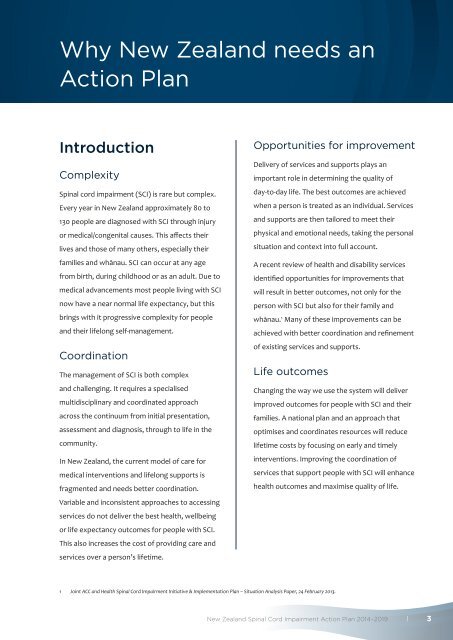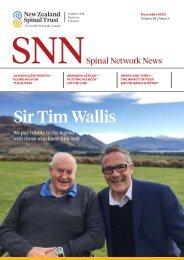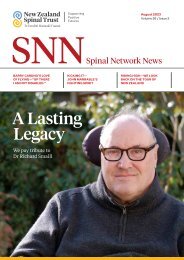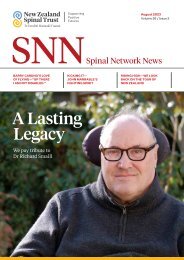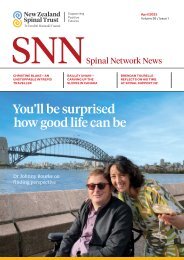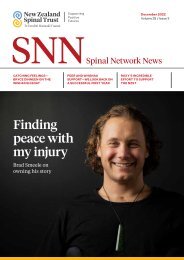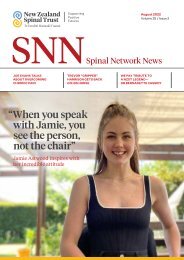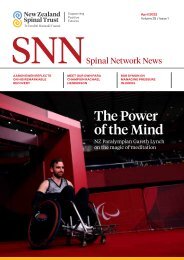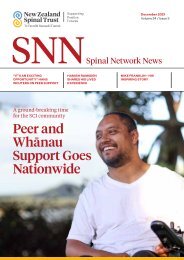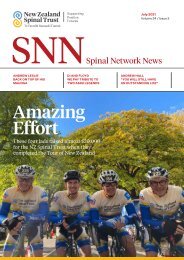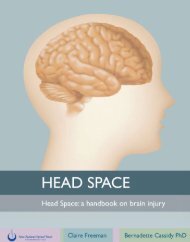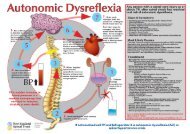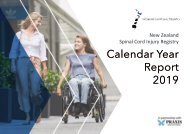SCI Action Plan 2014-2019
Create successful ePaper yourself
Turn your PDF publications into a flip-book with our unique Google optimized e-Paper software.
Why New Zealand needs an<br />
<strong>Action</strong> <strong>Plan</strong><br />
Introduction<br />
Complexity<br />
Spinal cord impairment (<strong>SCI</strong>) is rare but complex.<br />
Every year in New Zealand approximately 80 to<br />
130 people are diagnosed with <strong>SCI</strong> through injury<br />
or medical/congenital causes. This affects their<br />
lives and those of many others, especially their<br />
families and whānau. <strong>SCI</strong> can occur at any age<br />
from birth, during childhood or as an adult. Due to<br />
medical advancements most people living with <strong>SCI</strong><br />
now have a near normal life expectancy, but this<br />
brings with it progressive complexity for people<br />
and their lifelong self-management.<br />
Coordination<br />
The management of <strong>SCI</strong> is both complex<br />
and challenging. It requires a specialised<br />
multidisciplinary and coordinated approach<br />
across the continuum from initial presentation,<br />
assessment and diagnosis, through to life in the<br />
community.<br />
In New Zealand, the current model of care for<br />
medical interventions and lifelong supports is<br />
fragmented and needs better coordination.<br />
Variable and inconsistent approaches to accessing<br />
services do not deliver the best health, wellbeing<br />
or life expectancy outcomes for people with <strong>SCI</strong>.<br />
This also increases the cost of providing care and<br />
services over a person’s lifetime.<br />
Opportunities for improvement<br />
Delivery of services and supports plays an<br />
important role in determining the quality of<br />
day-to-day life. The best outcomes are achieved<br />
when a person is treated as an individual. Services<br />
and supports are then tailored to meet their<br />
physical and emotional needs, taking the personal<br />
situation and context into full account.<br />
A recent review of health and disability services<br />
identified opportunities for improvements that<br />
will result in better outcomes, not only for the<br />
person with <strong>SCI</strong> but also for their family and<br />
whānau. 1 Many of these improvements can be<br />
achieved with better coordination and refinement<br />
of existing services and supports.<br />
Life outcomes<br />
Changing the way we use the system will deliver<br />
improved outcomes for people with <strong>SCI</strong> and their<br />
families. A national plan and an approach that<br />
optimises and coordinates resources will reduce<br />
lifetime costs by focusing on early and timely<br />
interventions. Improving the coordination of<br />
services that support people with <strong>SCI</strong> will enhance<br />
health outcomes and maximise quality of life.<br />
1 Joint ACC and Health Spinal Cord Impairment Initiative & Implementation <strong>Plan</strong> – Situation Analysis Paper, 24 February 2013.<br />
New Zealand Spinal Cord Impairment <strong>Action</strong> <strong>Plan</strong> <strong>2014</strong>–<strong>2019</strong><br />
I<br />
3


